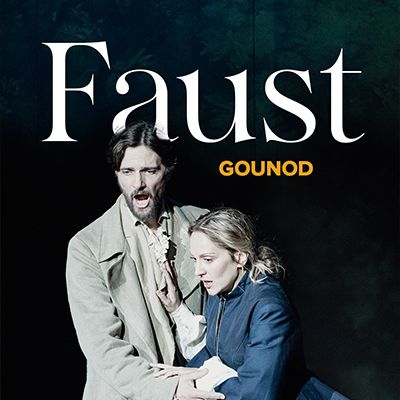| Gounod, Charles (1818-1893) | Faust |
| Opéra de Lille | ||
| Louis Langrée | Conductor | |
| Denis Podalydès | Director | |
| Éric Ruf | Set Designer | |
| Christian Lacroix | Costume Designer | |
| Bertrand Couderc | Lighting Designer | |
| Orchestre National de Lille | ||
| Chœur de l'Opéra de Lille | ||
| Cécile Bon | Choreography | |
| Laurent Podalydès | Actor | |
| Léo Reynaud | Actor | |
| Vannina Santoni | Soprano | Marguerite |
| Julien Dran | Tenor | Faust |
| Jérôme Boutillier | Baritone | Méphistophélès |
| Marie Lenormand | Mezzo-soprano | Marthe |
| Juliette Mey | Mezzo-soprano | Siebel |
| Lionel Lhote | Baritone | Valentin |
| Anas Séguin | Baritone | Wagner |
The aged Faust has read all the books. As his final hour approaches, neither science nor faith are worth as much to him as ‘the treasure that contains them all’ youth. To regain it, he will sell his soul to the restless incarnation of the devil, Mephistopheles. But will Marguerite's love and divine power thwart the devil's plans?
Few operas have enjoyed such an enviable fate as Gounod's Faust. Well received at its premiere, followed by international success, which still makes it the most performed French opera in the world today, just behind Carmen. But should we take this Faust literally? Or should we see it, in the twist of the fable, as a celebration of pleasures? From the demonic dance of the Golden Calf led by Satan himself to Marguerite laughing at her own beauty in the mirror, the audience can enjoy all the excesses, intoxicated by the music... without risking damnation. In Opéra de Lille’s production, this contradiction does not escape astute analysis of director Denis Podalydès. He sees here ‘a fundamentally anti-Puritan opera in a Puritan world, yet one that espouses its religious code and pretends to observe it. There is a dual or duplicitous aspect to this work – a structural hypocrisy typical of France’s Second Empire. For Gounod is a true Catholic plagued by demons that are all the more demonic because he is a fervent Christian.’ After examining another great figure of the theatre, Falstaff, Podalydès and his distinguished team tackles Goethe's tragic hero, using Jules Barbier's spoken dialogues, which were part of the work when it was first performed in 1859, to bring out all its ambiguities. A way of celebrating the eternal youth of Gounod's opera.
Recorded on 15.05.2025
Reviews of Faust directed by Denis Podalydès


